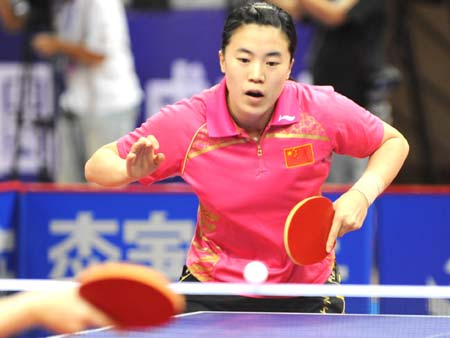World table tennis ruling body Saturday announced the replacement of Wang Nan by new generation Li Xiaoxia for September's women's World Cup, again prompting the speculation about the Chinese veteran's possible retirement after the upcoming Olympic Games on home soil.
The International Table Tennis Federation (ITTF) competition committee urged participants to the Sept. 6-8 World Cup in Kuala Lumpur to complete the entry form while mentioning that China's Wang Nan declined her participation and is replaced by world No. 3 Li Xiaoxia, the next eligible world ranked player.
 |
|
Chinese table tennis player Wang Nan returns the ball during the women's team contest at the warm-up competition ahead of the Beijing 2008 Olympic Games, in Wuxi city, east China's Jiangsu province, July 28, 2008. [Xinhua] |
Sixteen women paddlers will compete in the annual women's World Cup, which should include the defending champion, continental winners of the previous year, the current top six paddlers of the world and the wild cards by the host and the ITTF.
Wang, the 2007 World Cup holder who turns 30 in October, has long been rumored to play her last Olympic tournament here on Aug. 13-23 after coming out the most-winning woman in table tennis history with 23 world titles in her 23-year career.
"I've been expecting a happy ending for years," said Wang, a "Grand Slam" winner of Olympic Games, world championships and World Cup, right after she secured the berth to the Beijing Olympics last March in Hong Kong.
Wang does not care how many medals in prospect but only to stand in the field of the Beijing Olympic Games at the Beijing Univercity Gymnasium.
"To compete in the Olympics on home soil is the common wish of every Chinese athlete. That's a rare chance that people other than sportsmen may not fully understand," added the veteran, who freshed the gold medal record previously held by all-time great Deng Yaping.
She had declared last November to retire after the Beijing Olympics, the third for the 2000 Sydney champion of both women's singles and doubles events, if qualified.
"I set the Beijing Olympic Games an ultimate for my retirement," said Wang nine months ago.
Dubbed "Smiling Assasin" as she always smiles on and off the court, Wang gives the false impression that she is not fierce and hard-hitting in her strokes. The fact that she has won almost everything in table tennis world, however rules it wrong.
"Who knows? Maybe I'll play the 49th world championships." That's the answer two years ago for the question about her retirement after Wang led the Chinese national women's team to a clean sweep in the Doha Asian Games.
She had answered quite the same after the Busan Asian Games in 2002, when the leader to world table tennis reached her lowest ebb, losing in both the women's singles and doubles, as well as two crucial games in China's incredible and humiliating 3-1 final defeat to DPR Korea.
But Wang steeled herself after a string of defeats, rebounding to win all in Paris with the gold medals from the women's singles, the women's doubles and the mixed doubles.
Then in 2004 and 2006, she twice led the Chinese women's team to the Corbillon Cup in the 47th and 48th world team championships.
Will Wang retire after the Beijing Games? Or may she again surprise the world to continue as a long living legend like Swede Jan-Ove Waldner? Who knows?
(Xinhua News Agency August 4, 2008)